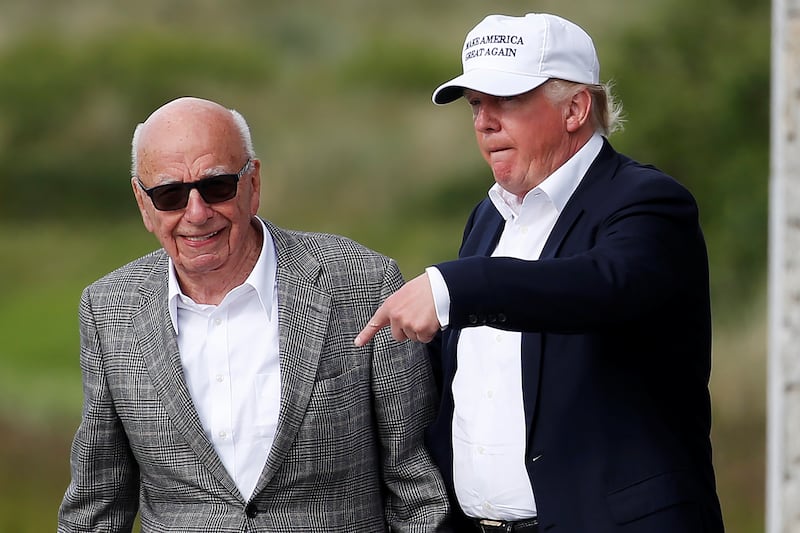As the loudest conservative TV megaphone and President-elect Donald Trump’s go-to viewing option, Fox News Channel would appear to be sitting on top of the world. Yet as the network has discovered in the past, the silver lining associated with its preferred candidate’s victory comes with its share of dark clouds.
In the plus column, Fox’s ratings surged in the immediate aftermath of the election, as Trump fans took a victory lap, and the network will enjoy plenty of access to the new administration, with Trump having practically taken up residence on the channel during the campaign, granting interviews to friendly personalities like Sean Hannity, Laura Ingraham and the Fox & Friends gang.

Trump has also exhibited a penchant for tapping Fox’s talking heads for policy roles, a revolving door already spinning with weekend host Pete Hegseth’s surprise selection to serve as secretary of defense.
The benefits of Fox’s cozy, almost symbiotic relationship with Trump, however, have the potential to be a decidedly mixed bag—a dream come true with its own nightmarish aspects.
Perhaps foremost, that begins with the network sacrificing its outsider status, becoming the mouthpiece for the White House instead of the most potent, highest-profile platform for the party out of power by hurling criticisms at its Democratic occupant.
In addition, as Trump made clear during the campaign, almost no amount of fealty or groveling is enough to satisfy him. In Trump’s eyes, that included publicly griping about Fox accepting ads that criticized him or booking representatives for his opponent, Kamala Harris, prompting him to post on his social-media site during the race’s waning days, “FOX NEWS IS NOT OUR FRIEND. It’s crazy!”

Competitively, Trump’s first term helped MSNBC enjoy an uptick as what amounted to the voice of the opposition. While many of that channel’s liberal viewers have fled—perhaps choosing to self-medicate by tuning out temporarily after their latest electoral disappointment—fresh outrages will bring some back, or at least make MSNBC their first stop when checking on what has become a frenzied news cycle during the transition period alone.
Granted, being the primary stop for Republican newsmakers will provide Fox with a certain edge, but that could easily be offset by the weight of Trump expecting, if not demanding, that the network continually provide him with a home-court advantage.

It’s worth noting, too, several key things have changed since the 2016 Trump presidential run, which began at Fox under the stewardship of then-CEO Roger Ailes. Despite personal failings that resulted in his ouster four months before the election amid sexual-misconduct allegations, Ailes fiercely protected the Fox brand, supporting Republican candidates but always putting the network’s prosperity first—and exerting influence over his top talent.
Still part of 93-year-old mogul Rupert Murdoch’s media empire, Fox is now under the more direct stewardship of his son, Lachlan, who doesn’t appear to exert the same control of Fox’s big names, who appear emboldened, again, by Trump’s win, raising questions over who’s really calling the shots there. The company’s cheerleading for Trump also proved costly as it echoed and amplified falsehoods about the 2020 election’s outcome, leading to the $787 million settlement won by Dominion Voting Systems that the Murdochs, and their lawyers, would surely rather not risk repeating.
Fox paid a literal price, in other words, for its loyalty to Trump. Nor should it be overlooked that Rupert Murdoch is embroiled in a legal skirmish with his other grown children, in what feels like a life-imitates-art version of HBO’s Succession; or that the cable TV model that has made Fox so profitable is gradually crumbling, as cable-news viewers age and digital options peck away at their business.
While the adage “Once bitten, twice shy” has seldom appeared to inform the behavior of most Fox hosts, at a corporate level an occasional wave of the caution flag, especially in the face of Trump’s more outlandish moments, seems prudent.

In late 2000, as Bill Clinton neared the end of his presidency, talk-radio titan Rush Limbaugh laughed off the suggestion that having a Republican in the White House would in any way hinder his ability to connect with listeners or make his job harder.
“Liberals are always my target. The notion I’m going to have nothing to say because Clinton is gone is ridiculous,” the bombastic host told me for the Los Angeles Times, adding in regard to his ratings, “I’ve always said it doesn’t matter who wins elections.”
Like Fox, Limbaugh thrived across decades, but it’s hard to argue his “targets” carried quite the same impact, or weight, when they were mere members of Congress, compared to the president of the United States and those closest to him.
Of course, the late host liked to say he possessed talent “on loan from God.” To avoid the possible pitfalls of Trump Part II turning into another instance of a disappointing sequel, Fox might need its own assist from a higher power.
Brian Lowry is a media columnist and critic who has previously worked for CNN, Variety, and the Los Angeles Times.
